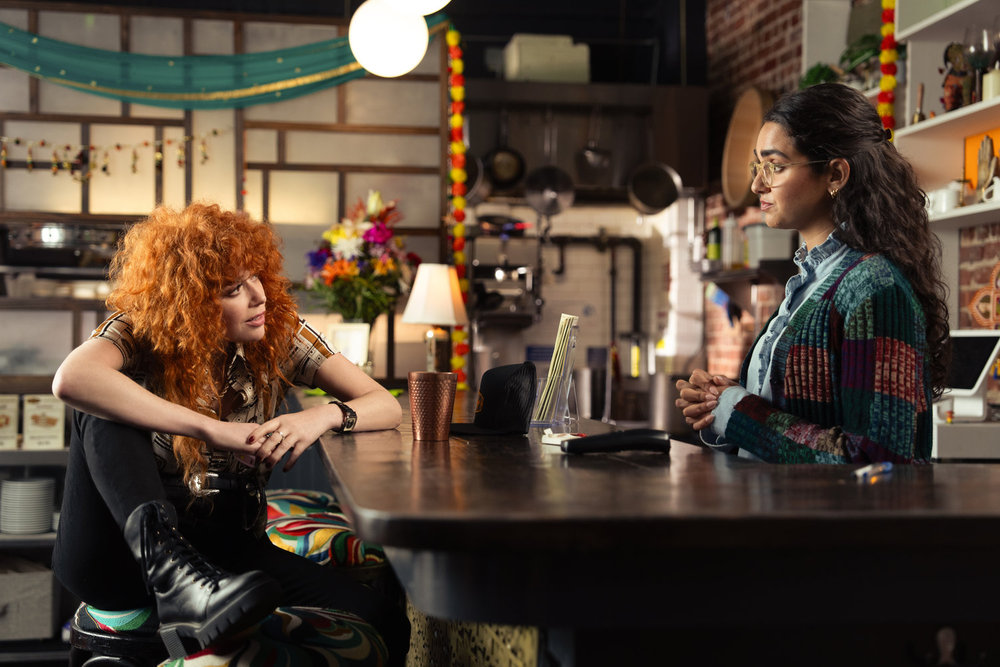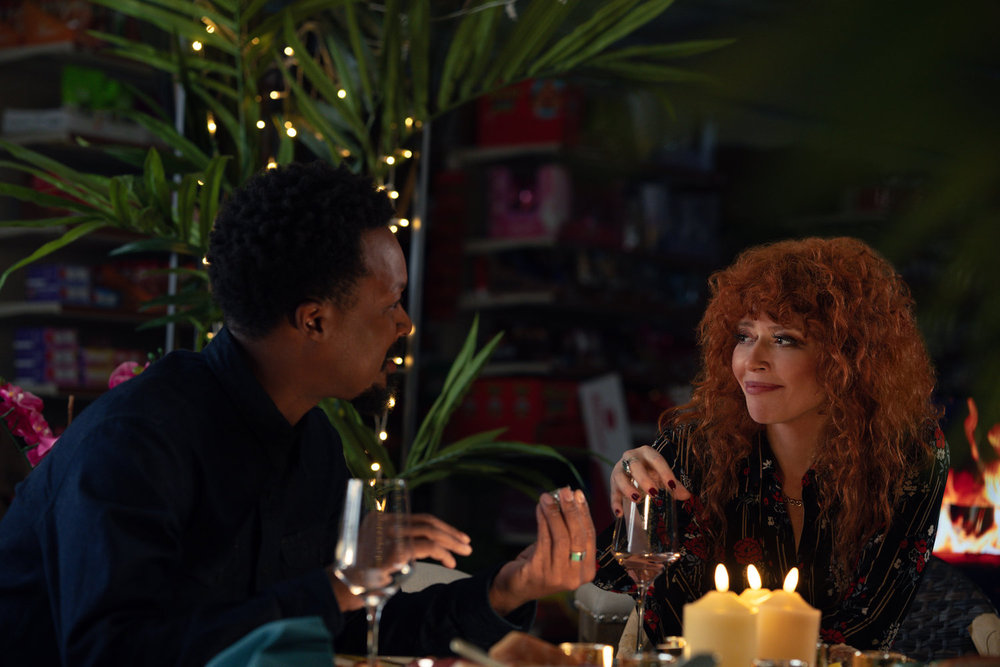In an era of ghost kitchens and gig app anonymity, it’s easy to forget that food delivery used to be, well, kind of intimate. You had a place. You had a person. Maybe they knew your usual order. Maybe they handed you your bag with a little eye contact and a smile. It wasn’t groundbreaking — just human. Which is exactly what makes the new episode of “Poker Face,” titled “One Last Job,” feel so unexpectedly tender: it sneaks a quiet love story into the middle of a heist, starring a delivery girl, a lonely man and a very well-timed order of samosas.
Set just days before Black Friday in a big-box appliance store called SuperSave, the episode follows Kendall, an action movie-obsessed employee with dreams of Hollywood, and Charlie Cale (Natasha Lyonne), the show’s signature sleuth, who stumbles into a murder while working as a delivery driver at a local Indian restaurant.
But beneath the flashy genre trappings — the safecracking, the double-crosses, the getaway plans gone sideways — “One Last Job” is about something sweeter and much more grounded: the small, persistent rituals that remind us what it means to be part of a community.
Kendall (Sam Richardson) is a longtime employee in SuperSave’s appliance section, but really, he wants to be a screenwriter. His latest script, also called “One Last Job,” outlines the perfect safe robbery and he’s proud enough of it to show it to his boss, Bill (Corey Hawkins), a man who’s not just Kendall’s supervisor, but is a longtime friend and maybe his only real fan. Bill thinks the writing is good. Good enough, in fact, that he fires Kendall on the spot — a tough-love nudge toward chasing his writing dreams.
This, naturally, backfires. Hurt and unmoored, Kendall links up with a scuzzy thief named Juice (James Ransone) and pitches him the same plan from the script: rob SuperSave’s safe the day after Black Friday when it’s flush with cash. It’s a classic heist-plot move — the script that becomes real, the guy who gets in over his head — but what makes this episode special is that it isn’t really about Kendall. It’s about Bill. And it’s about Charlie. And it’s about the takeout.
 “One Last Job” Season 2 Episode 7 — Pictured: (l-r) Natasha Lyonne as Charlie Cale, Geraldine Viswanathan as Jenny (Sarah Shatz/Peacock)
“One Last Job” Season 2 Episode 7 — Pictured: (l-r) Natasha Lyonne as Charlie Cale, Geraldine Viswanathan as Jenny (Sarah Shatz/Peacock)
By the time the heist is underway, Charlie, who’s recently arrived in town and taken a job delivering for a local Tandoori restaurant, has found herself making regular stops at SuperSave. Not to shop, but to drop off dinner for Bill. He keeps ordering — modest, comforting meals: two vegetable dishes, one lamb, garlic naan, chicken tikka. He seems like a creature of habit, especially after placing multiple orders in the same week following a spark during his first conversation with Charlie.
“Guess he really loves naan?” Charlie, already a little smitten, says to Jenny (Geraldine Viswanathan), the restaurant’s rom-com-obsessed hostess. Jenny starts reading the pattern like a love story. Ordering from the same place repeatedly just to see the delivery girl? And calling to check if she’s working? He’s interested.
We need your help to stay independent
To give Charlie a little flirtatious boost, Jenny slips in a free order of samosas. “Hot guys love samosas,” she says with a knowing smile. Sure enough — the night Charlie delivers them, Bill asks if she’d like to join him for dinner the next night, instead of just dropping off the food.
It’s such a small gesture, really. The samosas, the second helping of naan, the kind of slightly bashful dinner invitation that arrives not with a flourish, but with a container of lamb curry. Still, it lingers. That moment. It reminded me of something I’ve been thinking about recently: how comparatively intimate food delivery used to be.
There was a time — and it wasn’t even that long ago — when ordering in meant calling the restaurant directly. You’d ask for the usual. Someone behind the counter might recognize your voice. Maybe the delivery guy knew your dog’s name or how you liked your hot sauce on the side. Sometimes they’d come by in the middle of a snowstorm, plastic bags looped over each arm like ornaments, and you’d feel a little flutter of guilt and gratitude as you tipped in crumpled bills. It wasn’t dramatic or profound. But it was real.
Now, dinner shows up in the backseat of a Prius. Sometimes the bag has your name sharpied on it, sometimes it doesn’t. The driver might hand it to you or just leave it outside your gate. There’s no eye contact. No casual chit-chat. No sense that this was something exchanged between two people who live in the same city, maybe even the same zip code. It’s all been optimized into invisibility.
“It is a little sad, isn’t it? One more quiet thread snipped in the broader unraveling of neighborhood-ness. Of the small, repetitive exchanges that used to stitch a life together.”
This isn’t a tragedy. No one’s making a fuss about it. But it is a little sad, isn’t it? One more quiet thread snipped in the broader unraveling of neighborhood-ness. Of the small, repetitive exchanges that used to stitch a life together.
Of course, in today’s landscape of app-based convenience, even the slightest hint of familiarity can start to feel suspicious. It’s one of the quiet, strange side effects of having stripped so much human context out of something as personal as food delivery. When a person pierces the veil — when a face becomes familiar, or a name repeats itself — it doesn’t necessarily feel comforting. Sometimes, it just feels off.
About nine months ago, someone on Reddit posted in a delivery driver forum with the title: “Getting the same delivery driver multiple times, and it’s getting weird?” They’d been ordering wine through DoorDash and one night experienced a longer-than-usual wait time.
“When the guy finally took the order and arrived I tipped him $10 on a fairly small order,” the poster wrote. “The next time he was the dasher again. I tipped the same because it felt weird not to? And he sent me a message saying thanks, which was nice. I just did another order and this time he picked it up even though he looked pretty far away?”
He showed up and started chatting about the wine. Not in a creepy way, necessarily, just conversational. Friendly. And again, a thank-you message followed. This time, with their name. And a heart emoji.
“I just wanted to go back to cleaning the house,” the Redditor wrote. “It feels weird and like if I order again he will take it? Or am I overreacting.”
The replies were practical: A chorus of DoorDashers chimed in to clarify how the system works: drivers don’t select customers — the algorithm does. He likely didn’t know who he was picking up for until after the order was assigned. Maybe he just remembered the tip. Maybe he was trying to keep that tip coming. One user noted that the algorithm probably kept routing him the order because he’d been tipped well. Another added that most drivers couldn’t even see a customer’s full name and that the heart emoji, while unprofessional, was probably nothing more than a clumsy gesture of appreciation.
The original poster softened, too. They joked about sending their mastiff to the door next time. They admitted the driver didn’t give them bad vibes, just weird ones. That the heart emoji wasn’t scary, exactly. Just unfamiliar.
And that’s exactly it. The context is gone — there’s no shared understanding of what a regular delivery relationship is supposed to look like anymore. So the line between kindness and discomfort has blurred. Familiarity, once a sign of something warm and real, now arrives looking like a red flag.
Maybe that’s what makes the samosas and the dinner invitation that followed in this week’s episode of “Poker Face” feel so quietly radical. Not because they’re grand, but because they cut through the fog. A human gesture, tucked inside a system now designed for efficiency, anonymity and speed.
At one point in the episode, Bill tells Charlie that he actually loves working at SuperSave. Not because it’s necessarily glamorous, but because, to him, it’s a kind of modern town square.
“People want to gather,” he says. “People want ritual. People want connection.”
Read more
about this topic


